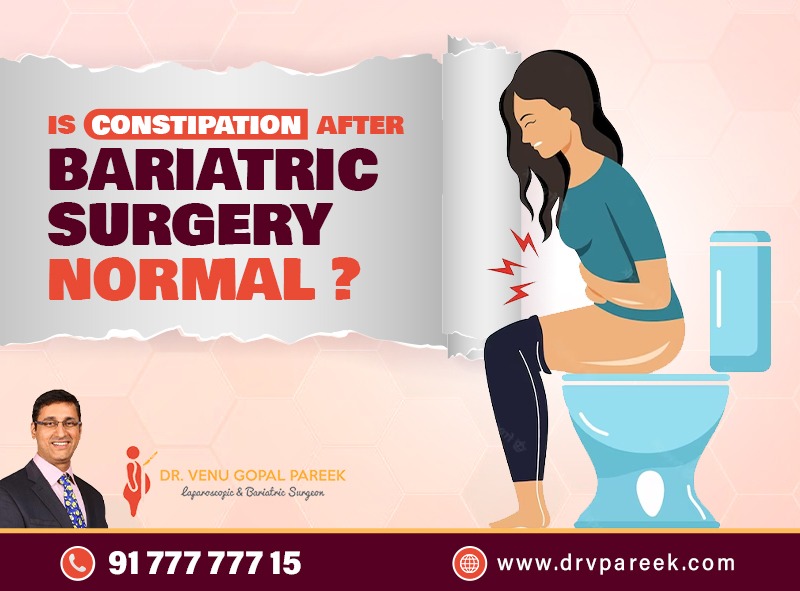
Is constipation after bariatric surgery normal?
Bariatric surgery is a powerful and effective way to help people lose weight, reduce certain health-related problems, and lead a healthier lifestyle. For people who are having trouble losing weight and managing their health conditions, it may be a life-changing option.
Most people do not suffer from any severe side effects after undergoing weight loss surgery. However, constipation is one of the most common complaints reported after undergoing bariatric surgeries like gastric sleeves or gastric bypass and gastric band surgery. Constipation is typically characterized by difficulty in passing stools or the inability to pass stools, often due to the stools being dry and hard.
Constipation is defined by hard faeces or infrequent bowel movements, which often happen less than once per week. Many individuals incorrectly assume they are constipated if they don’t go to the restroom every day, but in reality, the frequency of bowel movements might differ widely from person to person. The frequency of bowel movements after weight loss surgery could change and may not be as frequent as before surgery.
Most people who undergo bariatric surgery might experience temporary constipation, which is usually not serious. Knowing what causes it, how to prevent it, and how to treat it can help people find relief.
Constipation gets worse the longer it stays untreated. As the duration between bowel movements increases, the water in the stool is reabsorbed into the bloodstream, leading to the stool becoming hardened in the large intestine. Constipation is often associated with gas and pain.
How frequent is constipation following bariatric surgery?
Not all patients after bariatric surgery will have long-term constipation, but some may have mild, short-term constipation problems. After bariatric surgery, constipation may last around 4 and 6 months and usually resolves without medical treatment. Generally, constipation is caused by consuming diuretics, not drinking sufficient water, and not having enough fibre in the diet.
Weight loss surgery may result in less frequent bowel movements, but this does not necessarily imply that a person is constipated. Your digestive system has undergone many changes from surgery, which may have altered the way it works. To adjust to this “new” routine may take some time.
Possible causes of irregular bowel movements following bariatric surgery
Some people have bathroom habits that are normal and predictable. For example, you might be a person who goes to the washroom every morning right away, or you may only have a bowel movement every two days.
If you have had bariatric surgery, it is possible that your bowel movements will become irregular for a few weeks to months. This is because most weight loss surgery procedures involve reducing the stomach size, necessitating dietary alterations, and some procedures even alter the digestive system, which affects how our bodies get rid of waste.
Causes of constipation after bariatric surgery
The procedure for going through any major surgery might develop constipation. The use of general anaesthetic during surgery or taking some pain medicines might induce a temporary slowdown on the intestinal lane. However, below are the common causes of constipation after bariatric surgery:
Insufficient fluid intake: Drinking sufficient fluids is necessary for proper bowel movement. After bariatric surgery, patients may suffer from dehydration as the procedure can affect the absorption of fluids or are restricted their fluid intake. As a result, they may not get enough fluids which make the stools hard and dry that are difficult to pass.
Changes in diet: Patients may receive recommendations from doctors to eat smaller portions and avoid particular foods after having bariatric surgery. Due to insufficient consumption of fibre, water, and other essential nutrients that support regular bowel motions, these dietary alterations can result in constipation.
Medications: Constipation can be caused by some medications, including painkillers and iron supplements. Similarly, patients undergoing bariatric surgery may be given prescribed medicines to control their appetites and balance their blood sugar, both of which can contribute to constipation.
Changes in gut bacteria: The procedure can change the balance of intestinal bacteria, which might impact bowel movements.
Iron and calcium supplements: After surgery, patients might need to consume iron and calcium supplements as prescribed. Taking these supplements can also result in constipation as a side effect.
Physical inactivity: After bariatric surgery, patients often experience a period of restricted activity. Constipation might result from this inactivity because exercise helps to maintain regular bowel movements.
In order to avoid issues like haemorrhoids, hernias and intestinal blockages, it is very important to take proactive steps to prevent constipation.
If you are taking an iron supplement, you may be suggested to take a stool softener for a few weeks, until you can increase your intake of fluids and consume more fibrous food. Stool softeners like Colace are available over the counter and much more affordable.
Never hesitate to get in touch with your surgeon’s office if you continue to experience difficulties regardless of taking medicines.
Try not to use laxatives regularly. Taking more laxatives can lead your body to become reliant on them and you may not be able to have normal bowel movements without them.
Although constipation in the first three months after bariatric surgery is often due to the surgery, it is important to note that some bowel problems are unrelated and a direct correlation should not be considered. Follow your doctors prescribed food routine and exercise regularly. If you experience severe or persistent constipation after bariatric surgery, talk to your doctor, he can help you determine the underlying cause and recommend appropriate treatment.
If you are looking for bariatric surgery or post bariatric consultation to fix related problems, consult Dr. V Pareek, one of the best bariatric surgeon in Hyderabad. Call +91 91-777-77715 for appointment booking.







